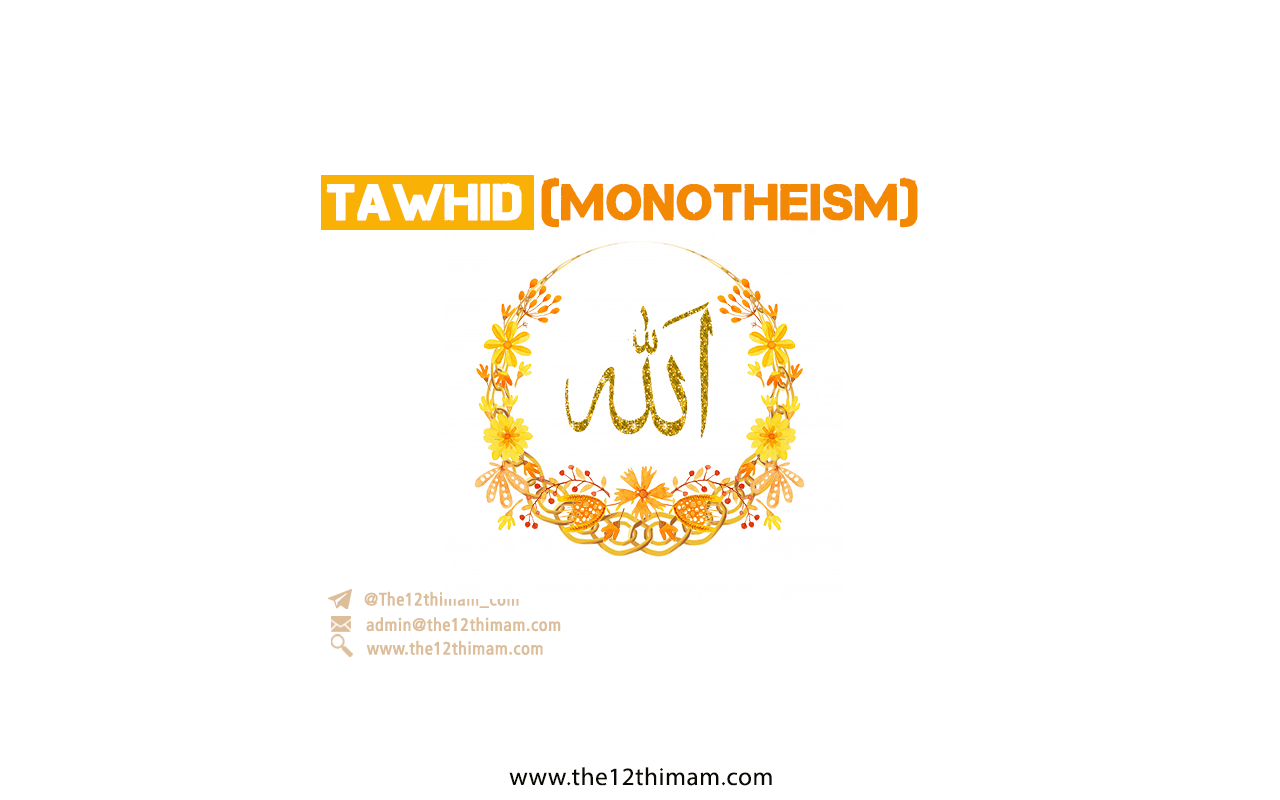Tawḥīd (Arabic: التَوحيد), or monotheism is the most fundamental doctrine in Islam, which means believing in the oneness and uniqueness of God and not ascribing any partners to Him. The message of the Prophet Muhammad (s) since the beginning of his mission was based on the call for tawhid and the rejection of polytheism. Tawhid is a major theme in the Qur’an and hadiths. Al-Tawhid is also one of the names of sura 112 of the Qur’an, which presents a brief but deep expression of the doctrine.
In Islam, tawhid stands in contrast to shirk (ascribing partners to God). Muslim theologians have counted a number of levels for tawhid: al-tawhid al-dhati (unity of the divine essence), which refers to the belief in God as the only God and negating any partners for Him; al-tawhid al-sifati (unity of the divine attributes), which refers to the identity of divine essence with divine attributes; al-tawhid al-af’ali (unity of actions), which refers to the fact that God is the only independent cause and that He needs no assistance for His actions; al-tawhid al-‘ibadi (unity of worship), which refers to the fact that no one other than God deserves to be worshiped.
There are various arguments for tawhid in the Qur’an, hadiths, and the works of Muslim philosophers and theologians. The argument of tamanu’ (Argument of Antagonism), the argument from appointing prophets, and the Argument of the Impossibility of Multiplicity are some of the arguments presented by Muslim theologians and philosophers for tawhid.
Tawhid, in the sense of believing in the oneness of God, is the most fundamental Islamic doctrine,[1] according to which the One God is the sole creator of the world and does not have any partners.[2] Tawhid is also used, as seen in some hadiths, to mean confessing this doctrine. Sometimes the term tawhid refers to the theological discussions related to God, His attributes, and actions. According to hadiths, the Prophet (s) used the word to mean the affirmation of the proposition “lā ilāh illā Allāh, waḥdah lā sharīk lah” (لا إله إلا ألله، وحده لاشريک له, there is no god except Allah, he is one and has no partner). In response to questions about tawhid, Imam al-Sadiq (a) and Imam al-Reza (a) have brought up some theological discussions such as negating human attributes from God.[3]
Tawhid is regarded as the most important characteristic teaching of Islam.[4] As the Qur’an stipulates, all the prophets (a) called people to tawhid.[5]
Confessing tawhid and rejecting polytheism are among the first teachings of the Prophet (s), which he proclaimed at the beginning of his mission in Mecca.[6] The representatives that the Prophet (s) sent to various places, such as Mu’adh b. Jabal, would first and foremost call people to tawhid. [7]Imam Amir al Momenin Ali (a) states that believing in the oneness of God is the foundation of knowing God.[8]
Tawhid is emphasized in the Qur’an in various words and expressions. Negating other gods, emphasizing the oneness of God for all, condemning polytheists, rejecting the Trinity, and negating anything that is similar to God are among the themes related to tawhid in the Qur’an.[9] Some of the Qur’anic verses about tawhid are,
- Say, ‘He is Allah, the One’. (Qur’an 112:1)
- There is no god except Allah. (Qur’an 37:35, Qur’an 47:19)
- Your god is the One God, there is no god except Him. (Qur’an 2:163)
- Your God is the One God. (Qur’an 18:110, Qur’an 21:108, Qur’an 41:6)
- There is no god except Allah, the One. (Qur’an 38:65)
In accordance with the Qur’an and the sayings of the Prophet (s) and the Imams (a), many theologians, philosophers, and mystics have counted several levels for tawhid:
- Al-Tawhid al-dhati (unity of the essence),
- Al-Tawhid al-sifati (unity of the attributes),
- Al-Tawhid al-af’ali (unity of actions),
- Al-Tawhid al-‘ibadi (unity of worship). [10]
In Islam, tawhid is in contrast with shirk (ascribing partners to God), and thus eliminating shirk is one of the main themes and aims of the Qur’an.[11] Just as different levels have been mentioned for tawhid, shirk also is considered to have different levels:[12] al-shirk al-dhati is the belief in more than one God;[13] al-shirk al-af’ali is the belief in more than one independent cause in the world;[14] al-shirk al-sifati is the belief in the ontological multiplicity of God’s attributes and their distinction from His essence,[15] and al-shirk al-‘ibadi is worshipping something other than the one God.[16]
Unity of the Essense
Unity of the essence is the first stage of monotheism,[17] consisting in the belief in the oneness of divine essence. That is, the divine essence is not subject to plurality and has no peer.
In the terminologies of theology and philosophy, Unity of essence has two meanings:
- God is one, it has no peer, and it is inconceivable for Him to have a second.
- The divine essence is simple, in the sense of not being composed of parts.[18]
Qur’an 112 (Sura al-Tawhid), refers to both kinds of Unity of essense: the word ‘Aḥad’ at the beginning of this sura refers to the simplicity of divine essence,[19] and the last verse (‘there is none like unto Him’) refers to the rejection of any peers and partners about God.[20]
Unity of the Attributes
Unity of the attributes is the view that the divine essence is identical with divine attributes. Thus, the divine knowledge is not distinct from divine power; all His being is both knowledge, power, and other attributes through and through, and all His attributes are identical to one another and to his essence.[21] Contrary to other beings, in which attributes are distinct from their essence, and they gain the attributes. [22]
Qur’an has cleared God from the attributes.[23] In a speech narrated by Abu Basir, Imam al-Sadiq (a) attributes divine knowledge, hearing, sight and power to divine essence and has stipulated that God has been able to hear and see before there had been anything to be heard or seen.[24]
Unity of Actions
Unity of actions (al-tawhid al-af’ali) is the view that in order to do His acts, God does not need anything or anyone other than His own essence—He is independent in all His acts.[25] According to the unity of actions, nothing in the world can have any effects or do anything except in virtue of the power it is given by God; all actions, movements, and effects are originated in His essence. He has no partners in His essence, He has no partners in His agency—including creation, monitoring, owning, and governing the world.[26]
Qur’an introduces God as the creator of everything and the one, all paramount.[27]
Imam al-Sadiq (a) has considered God as the only one who can create something from nothing.[28]
Unity of Worship
Unity of worship is a sort of theoretical monotheism, which amounts to the thought that nothing except Allah is worthy of worshiping—that is, there is no god except Allah. Therefore, every person has to worship God and on the basis of His commands.[29] According to Qur’an inviting to worship the One God is the primary mission of all of the prophets.[30] Monotheism in worship has been referred to by some Qur’anic verses, such as Qur’an 6:102, Qur’an 1:2-5, Qur’an 21:25.
This is taken to be implied by other types of monotheism: if our existence is from Allah, our survival depends on Him, the only truly independent cause in the world is Allah, and it is only Allah who has the right to command and legislate, then no one else is worthy of worship. Any non-divine motivations involving in worships reduces their value and it sometimes leads to their religious invalidity.
Arguments
In the Qur’an and hadiths and in the works of Muslim philosophers and theologians, a number of arguments have been mentioned for tawhid. Some of these arguments are as follows:
- Argument of Tamanu’ (mutual exclusion), which is based on Qur’an 21:22[31], seeks to demonstrate tawhid by refuting shirk.[32] This argument has been formulated in the following way:
If there were two gods and one of them willed to do something and the other willed to do its opposite, one of the following would happen:
- What both of them have willed will take place. This leads to contradiction and is impossible.
- None will take place. This also leads to contradiction and is impossible.
- What one of them has willed will take place. This shows that only one of them is the real God.[33]
- Argument of Multiplicity is among the arguments set forth in Islamic philosophy for the oneness of God. According to this argument, if there were more than one god (or necessary existent), each of them would have a common aspect with the other gods—as they all are necessary existents—and an exclusive aspect. This means that each god is combined of a common aspect and an exclusive aspect. However, this is impossible, because a necessary existent cannot be a compound being, as every compound being is in need of its parts, and therefore its existence is not necessary by itself. Therefore, there is only one necessary existent. [34]
Other arguments have also been presented by Muslim theologians and philosophers for the oneness of God, such as the Argument of Specificity (ta’ayyun), the Argument of the Impossibility of Multiplicity, the Argument of the Multiplicity of the Objects of Power, and the Argument from Appointing the Prophets.[35] The latter is taken from Imam Ali’s (a) letter to his son Imam al-Hasan (a), in which it is stated that if God had any partners, they would send their prophets to people.[36]
Reference:
Karīmī, Tawḥīd az dīdgāh-i āyāt wa riwāyāt, p. 19-20.
Karīmī, Tawḥīd az dīdgāh-i āyāt wa riwāyāt, p. 19-20.
Ṣadūq, al-Tawḥīd, p. 48-51.
Ṣāfī, Tajallī-yi tawḥīd dar niẓām-i imāmat, p. 21.
Yaḥyā, “Masīr-i tawḥīd dar ʿālam-i Islām”, p. 196.
Yaʿqūbī, Tārīkh al-Yaʿqūbī, vol. 2, p. 24.
Yaʿqūbī, Tārīkh al-Yaʿqūbī, vol. 2, p. 76-81.
Nahj al-balāgha, p. 39.
Ṭārimīrād, “Tawḥīd”, p. 406-407.
Riyshahrī, Dānishnāma-yi Qurʾān wa ḥadīth, vol. 5, p. 419.
Subḥānī, Simā-yi insān-i kāmil, p. 291.
Subḥānī, Simā-yi insān-i kāmil, p. 291.
Subḥānī, Simā-yi insān-i kāmil, p. 292.
Subḥānī, Simā-yi insān-i kāmil, p. 294.
Karīmī, Tawḥīd az dīdgāh-i āyāt wa riwāyāt, p. 54.
Subḥānī, Simā-yi insān-i kāmil, p. 296.
Karīmī, Tawḥīd az dīdgāh-i āyāt wa riwāyāt, p. 79.
Karīmī, Tawḥīd az dīdgāh-i āyāt wa riwāyāt, p. 79.
Subḥānī, Sīmā-yi ʿaqāʾid-i Shīʿa, p. 34.
Subḥānī, Sīmā-yi ʿaqāʾid-i Shīʿa, p. 34.
Karīmī, Tawḥīd az dīdgāh-i ʿaql wa naql, p. 87.
Karīmī, Tawḥīd az dīdgāh-i ʿaql wa naql, p. 87.
Clear is your Lord, the Lord of Might, of whatever they allege [concerning Him]. (Qur’an 37:180)
Kulaynī, al-Kāfī, vol. 1, p. 107.
Karīmī, Tawḥīd az dīdgāh-i ʿaql wa naql, p. 93.
Karīmī, Tawḥīd az dīdgāh-i ʿaql wa naql, p. 93.
as an example: Say, ‘Who is the Lord of the heavens and the earth?’ Say, ‘Allah!’ Say, ‘Have you then taken others besides Him for guardians, who have no control over their own benefit or harm?’ Say, ‘Are the blind one and the seer equal? Or are the darkness and the light equal?’ Have they set up for Allah partners who have created like His creation, so that the creations seemed confusable to them? Say, ‘Allah is the creator of all things, and He is the One, the All-paramount.’ Qur’an 13:16. also see: Qur’an 6: 102 and 164, Qur’an 7: 54, Qur’an 12: 40
Majlisī, Biḥār al-anwār, vol. 4, p. 148.
Karīmī, Mabdaʾ shināsī, p. 43.
Karīmī, Tawḥīd az dīdgāh-i ʿaql wa naql, p. 114.
Had there been gods in them other than Allah, they would surely have fallen apart (Qur’an 21:22)
Yathribī, Tārīkh-i taḥlīlī intiqādī-yi falsafa-yi Islāmī, p. 503-504.
Yathribī, Tārīkh-i taḥlīlī intiqādī-yi falsafa-yi Islāmī, p. 504.
Yathribī, Tārīkh-i taḥlīlī intiqādī-yi falsafa-yi Islāmī, p. 508-509.
Yathribī, Tārīkh-i taḥlīlī intiqādī-yi falsafa-yi Islāmī, p. 506-515.
Nahj al-balāgha, p. 396. (wikishia.net)



